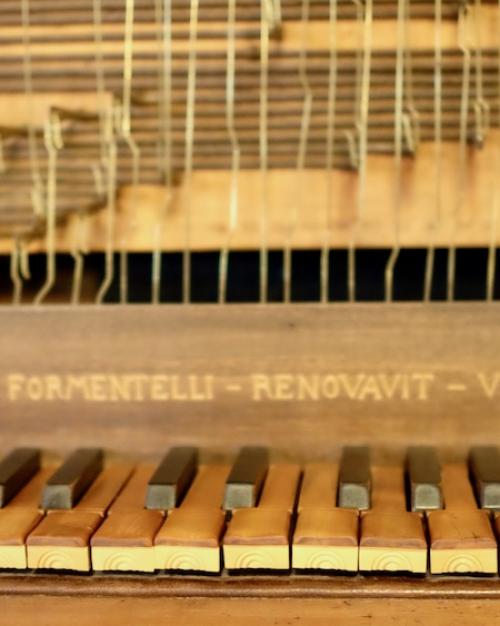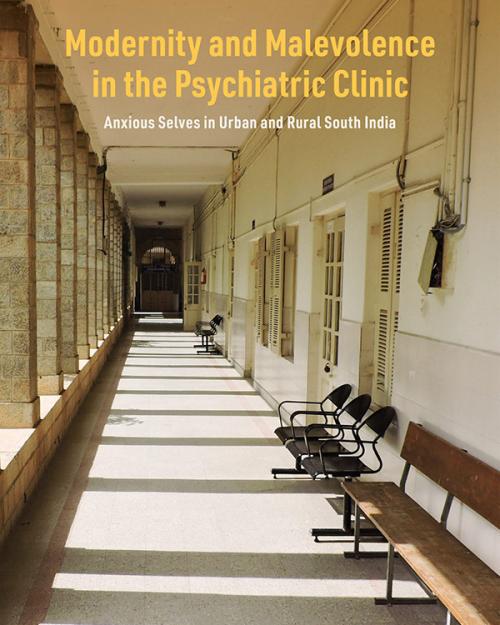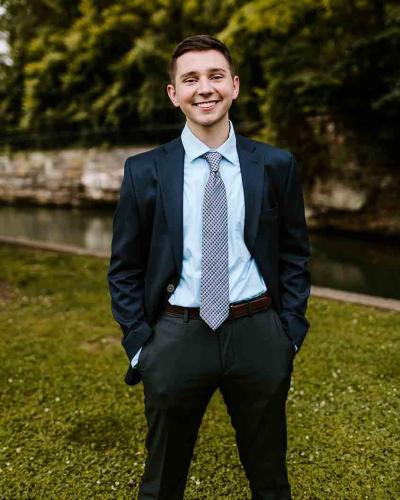Canyon Cross '25 shares his experiences majoring in anthropology as he reflects on his time at Cornell before graduation.
What inspired you to choose Anthropology as your major? Do you have a specific area of interest?
When I got to college, I didn’t know what I wanted from my undergraduate education, really. I knew that I wanted to be a physician, but the particular academic field that I wanted to operate in during the next four years wasn’t apparent at first. I’ve always been someone with interests across disciplinary boundaries, so I didn’t just want to be a sciences student or just a humanities student. I entered as a Biological Sciences major but quickly found that there wasn’t much room for me to critique and combine ideas, so I switched to Biology and Society. Eventually, though, I found myself looking for a home within a specific discipline rather than a combination of lots of different fields into one. It felt like there wasn’t a continuity to what I was studying, and that I was kind of bouncing around from course to course with no real through-line to the work I was doing. Eventually, I stumbled across Anthropology as a discipline and started to learn more about it. I’ve known for quite some time that my life’s purpose is servant leadership, so in the summer between my sophomore and junior years, I thought, “well, if I’m supposed to serve people, then I should probably study them.” When I got back in the fall, I submitted the paperwork to declare in Anthropology.
My specific interest lies in the realm of the human experience of health and mostly draws from the subfields of Biological and Cultural Anthropology. I’m fascinated with the idea that humans exist as distinctly biocultural beings, and my favorite things to learn about are the ways in which culture directly impacts human biology and health (and vice versa).
Was there a particular faculty member or class that influenced you?
It would be impossible for me to pick just one class or professor that’s impacted me most, but I’ll focus on a main few here.
With regard to the theory and practice of Anthropology overall, Dr. Viranjini Munasinghe taught my ANTHR 3000: 'Introduction to Anthropological Theory' seminar. She really pushed me to expand my view of what Anthropology was and to see the ways that theory, while sometimes dense and not immediately tangible, could be used in very practical ways.
My first Anthro class was ANTHR 2245: 'Health and Disease in the Ancient World’ with Dr. Matthew Velasco. Since then, I’ve also taken ANTHR 3235: 'Bioarchaeology’ with Dr. Velasco. A bioarchaeologist, Dr. Velasco demonstrated to me the most explicitly visible combination of the hard sciences, social sciences, and humanities that I’ve been searching for. His courses taught me that, in reality, we obtain the best understanding of that which we are studying by drawing on techniques of analysis from across our scientific and interpretive toolkits.
Dr. Adam Arcadi taught me to rethink my relationship to the hard sciences and to frame my understanding of humanity within a much longer and larger timeline of evolution in ANTHR 1300: ‘Human Evolution.’ Being reminded of the fact that rudimentary cultural structures exist as byproduct of our biology and that culture has emerged as something that is evolutionarily advantageous helped me rethink the ways in which I analyze social connections and their influence on our physical existence. ANTHR 1300 was also the first time at Cornell that I got to work with human osteology and fossil remains in a lab setting to really place my interest in the human body at my fingers, something that my friends in other life science majors haven’t been afforded the opportunity to do.
Finally, Dr. Stacey Langwick demonstrated to me the power of Sociocultural Anthropology and, more broadly, the power of writing and storytelling in cultural analysis. ANTHR 4442: ‘Toxicity’ and ANTHR 4682: ‘Medicine and Healing in Africa’ forced me to reckon with what knowledge is, what knowledge “counts,” and how knowledge changes our being. Dr. Langwick often placed us unapologetically in seemingly impossible “double binds” and challenged us to think our way through them; something that I will most certainly continue to value as I wrestle with my own perceived solutions to the big issues in life.
Of course, all these folks were also incredibly kind, intelligent, wise, intellectually and personally humble, and (with great thanks on my end) gracious. I am so thankful to have known and learned from them, and I hope to continue to learn from them even as I leave this place.
What are your plans for the near future?
After leaving Cornell, I plan to take a bit of a break from academia more broadly. I plan to spend a year out, hopefully working in some kind of public health role, before returning to graduate school to obtain my Masters of Public Health in some kind of social epidemiology. Afterwards, I plan to attend medical school and hope to become a family physician working in public and global health.
What do you think you'll miss most about Cornell/Ithaca after graduation?
A cliché and very “anthropology” answer, but I will most miss the people. Some of the smartest, most innovative, and most down-to-earth individuals have surrounded me in this place over these years and I’ll miss the ability to interact with them on a daily basis. I will also miss the physical space of campus itself. Walking over waterfalls on my way to learn from some of the greatest minds on earth in old buildings that have been here for over a century is still such a great privilege; something I’ve dreamed about since I first saw Harry Potter. Also, as someone who loves the outdoors, I don’t know if I’ll be on a better campus for my personal tastes ever again.
Do you have any advice for students new to Anthropology?
I think my biggest point of advice is twofold.
First, refuse the false notion that you need to choose a narrow path in the discipline. In my opinion, because Anthropology as a profession is so geared toward graduate school, there can be a tendency to specialize very quickly. Don’t. Instead, take classes and read widely across the subfields. To me, the best readings in my courses are the ones that “bring it all together” in a way; work that demonstrates the interplay between our biology and our culture to more deeply understand who we are.
Second, and perhaps more importantly, is that there is great value, purpose, and need in this field. Not just from the institutional perspective. Anthropology is remarkably well positioned to offer us insight and solutions within some of the most complex issues of today, and the way that it is applied is entirely up to us. So, no matter what field (academic or professional) it is that you go into, know that the toolkit you get from studying Anthropology is a way of thinking that is rarely found elsewhere in the world: to make the familiar strange and the strange, familiar. Use that toolkit no matter where you are or what you’re doing and you’ll always remain, in some form, an Anthropologist.





